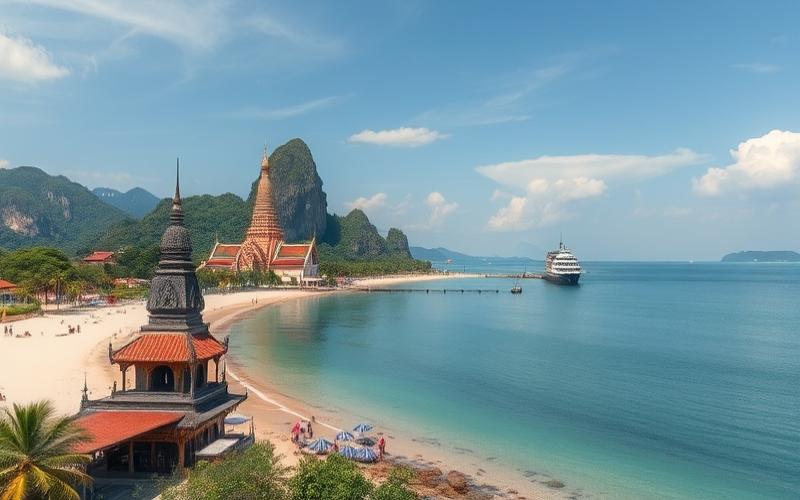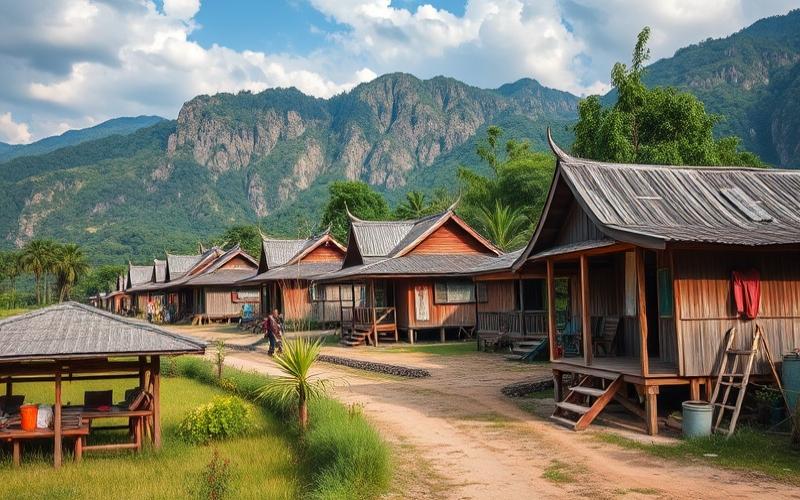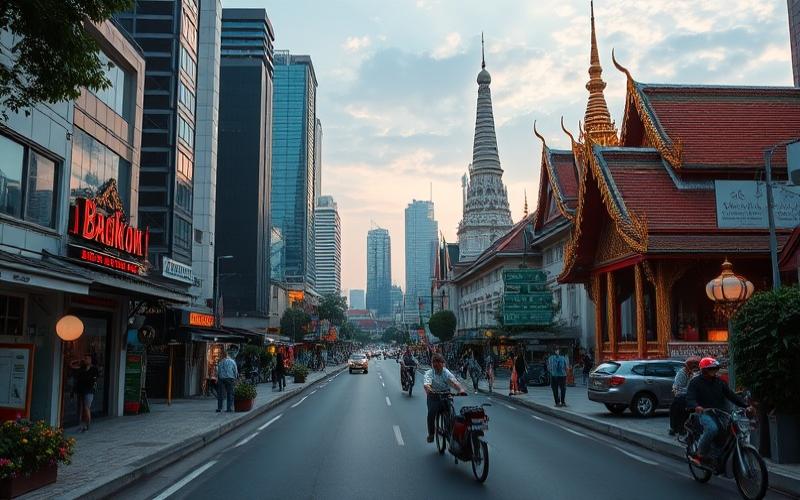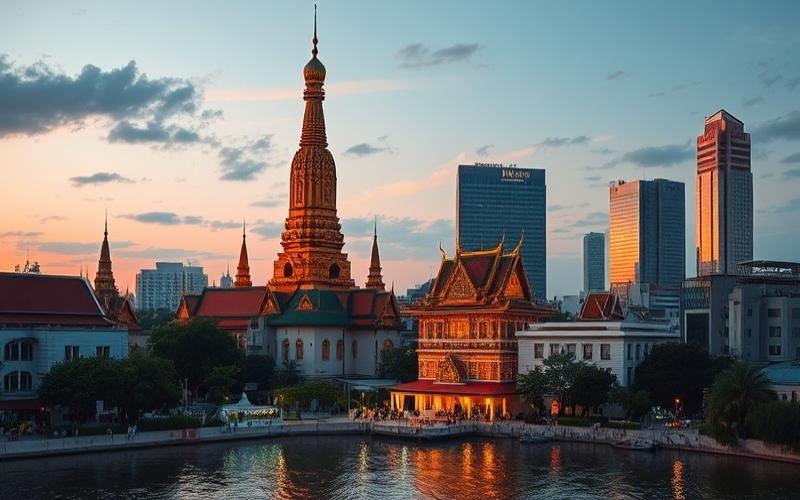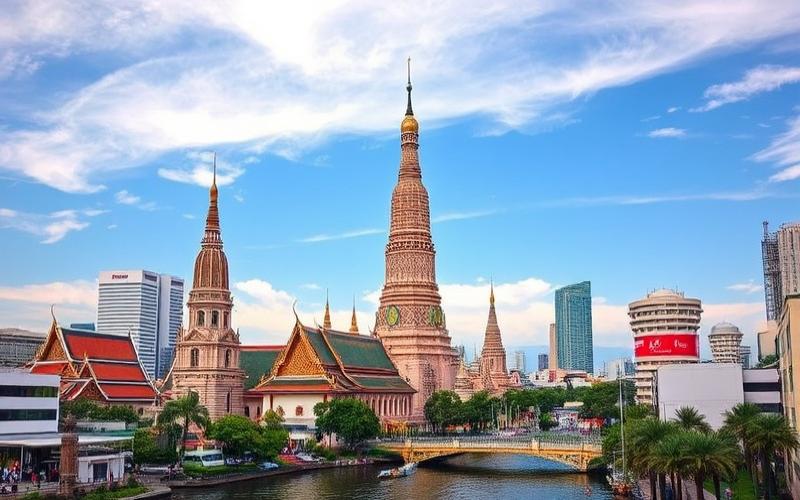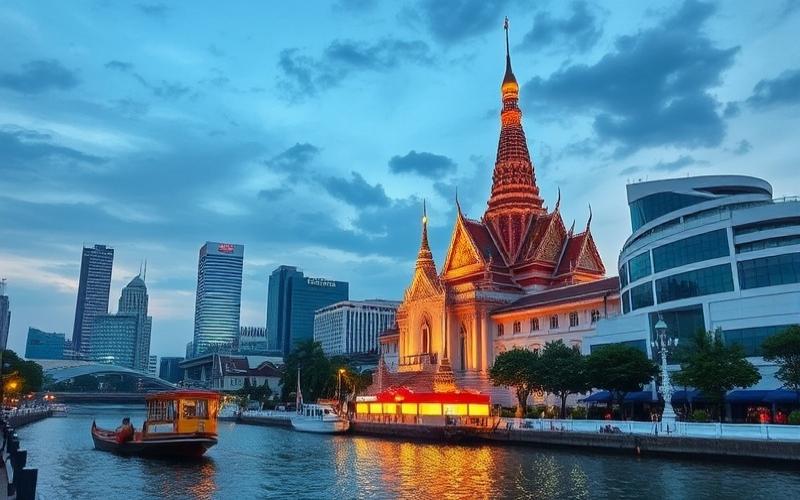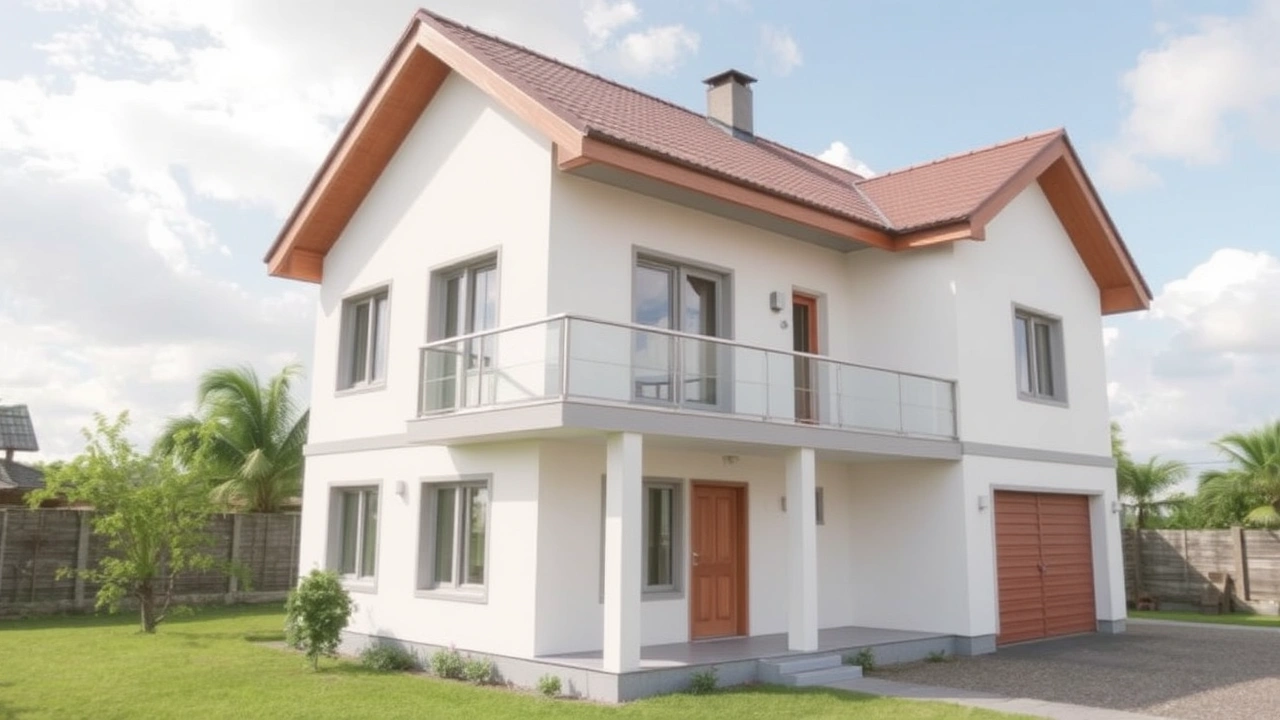
 Published on and written by Cyril Jarnias
Published on and written by Cyril Jarnias
Thailand: An Economic Hub in Transformation
As Thailand continues to attract massive investments and its economy undergoes rapid transformation, some of its cities are seeing real estate prices skyrocket at breakneck speed.
Thanks to its strategic positioning in Southeast Asia, the country is preparing to become a central economic hub, creating unprecedented pressure on the cost of living in key cities.
Unprecedented Real Estate Price Surge by 2030
By 2030, some of these metropolitan areas will experience an unprecedented price explosion, shaping the country’s urban and economic future.
Good to Know:
This price surge could completely redefine the Thai economic landscape and create new regional dynamics.
Which Cities Will Be Most Impacted?
Discover which cities are at the heart of this transformation and how this price surge could redefine Thailand’s economic map.
Thailand’s Booming Cities: Where to Invest?
Bangkok, Chiang Mai, Pattaya, and Phuket are among the Thai cities that have demonstrated strong economic and urban growth potential in recent years. Several structural factors enhance their attractiveness for real estate investment: rapid urbanization, government incentive policies, major infrastructure development, and growth in international tourism.
| City | Recent Developments | Initiatives & Projects | Impact on Real Estate Demand |
| Bangkok | Expanded metro system (MRT/BTS), new business districts (Rama 9, Bang Sue), urban infrastructure renovation. | Free zones for foreign investors, major mixed-use projects (One Bangkok). | Strong rental demand; estimated annual price growth of 5%. |
| Phuket | Airport modernization; improved road networks; luxury hotel complexes. | STAR project for sustainable tourism; encouraged foreign investment in beachfront residences. | High rental yields on luxury villas/condos due to international tourism. |
| Chiang Mai | Urban road network expansion; new cultural spaces and coworking for digital expatriates. | Promotion as “smart city” destination by government; support for local startups. | Growing demand for long-term rentals by expatriates/digital nomads. |
| Pattaya | Port development and expressway connections to Bangkok; new affordable residential complexes. | Support for hotel/tourism sector; coastal development security plans. | Attractive prices with above-average national yields. |
- The Thai real estate market is currently benefiting from the massive return of international investors.
- Public policies encourage capital flows through favorable tax measures in certain key urban areas.
- Integrated “resort-casino” projects planned from 2025 in Bangkok, Chonburi (Pattaya), Chiang Mai, and Phuket are expected to generate over 40,000 direct jobs and significantly increase annual tourist traffic.
Macroeconomic & Geopolitical Factors:
- Moderate economic growth expected between +1.3% and +2.3% in 2025 according to NESDC.
- Trade tensions with the United States could impact overall attractiveness, but sector diversification limits this risk in major cities.
- Tourism remains the main driver: stated goal of 40 million foreign visitors in 2025.
Current Real Estate Trends:
- Growing demand for luxury apartments in Bangkok;
- Sought-after beachfront villas in Phuket (+7% average price/year);
- Dynamic rental market in Chiang Mai among expatriates;
- Affordable prices offering strong rental yields in Pattaya.
Forecasts Through 2030:
| City | Expected Demographic Change | Employment Opportunities | Anticipated Real Estate Price Change (%) |
| Bangkok | Continued increase (+8% urban population) | Major service hubs – fintech/logistics/media | +30% / decade |
| Phuket | Moderate increase linked to tourism recovery | Hospitality/restaurant/healthcare | +45% / decade (premium) |
| Chiang Mai | Stable growth driven by digital expatriation | Technology/education/culture | +25% |
| Pattaya | Strong increase linked to European & Russian retirees | Tourism/entertainment/private healthcare | +35% |
Additional Lists:
Key Macroeconomic Drivers Influencing These Markets:
- Post-pandemic recovery boosted by hospitality/restaurant sector.
- Proactive policy of opening to foreign capital under specific conditions.
- Massive public investments in smart urban mobility (“smart cities”).
Notable Case Studies:
- One Bangkok: First XXL mixed project combining international offices, five-star hotels, and premium condos—estimated value exceeding 100 billion THB upon completion around 2030.
- STAR Phuket Project: International environmental certification aiming for controlled attendance while increasing high-end hotel capacity.
In summary:
The combination of sustained infrastructure development (metros, modernized airports), targeted government support (free zones, favorable taxation), and tourism explosion places these cities among the main Asian hotspots for investment before 2030.
Good to Know:
Bangkok, Chiang Mai, Pattaya, and Phuket stand out as Thai cities with strong investment potential, benefiting from notable recent infrastructure developments and government initiatives encouraging foreign investment, particularly through special economic zones and tax incentives. Bangkok, as the country’s nerve center, capitalizes on its public transport projects to support rising real estate prices, while Chiang Mai, with its growing population and technological opportunities, attracts increasing numbers of expats and startups. Pattaya and Phuket, meanwhile, see increased demand in rental real estate, supported by tourist influx influencing long-term profitability. By 2030, prices are expected to rise significantly due to factors like job expansion, rapid urbanization, and better-planned sustainable infrastructure projects, despite potential challenges like overconstruction and geopolitical uncertainties; thus, early investments in these dynamic hubs can offer attractive returns.
Real Estate in Thailand: Growth Prospects Through 2030
The growth prospects of Thailand’s real estate market through 2030 are driven by a combination of macroeconomic factors, government initiatives, and socioeconomic trends that structure demand and attractiveness in major metropolitan areas.
Macroeconomic Factors Influencing the Real Estate Market:
- Government Policy:
- Long-term visa program for investors and highly qualified foreigners.
- Tax benefits (BOI privileges) for foreign real estate investments.
- National strategy focused on commercial openness, industrial development, and urban planning around the Eastern Economic Corridor (EEC).
- Demographic Evolution:
- Rapid urbanization with increasing concentration in major cities.
- Young, qualified urban population favoring modern residential demand.
- Foreign Investments:
- Strong presence of Asian investors (China, Hong Kong), as well as American, British, and Japanese investors in the residential sector.
Thai Real Estate Sector Growth Forecasts:
| Segment | Estimated Value in 2024 | Forecast for 2030 | Average Annual Growth |
|---|---|---|---|
| Residential | $71.27 billion | $88 billion | 3.49% |
| Residential Real Estate* | $154.51 billion | — | 5.54% |
*Growth is particularly supported by villas in Phuket as well as strong transactional activity on condominiums in Bangkok.
Cities with Strong Upside Potential:
- Bangkok
- Chiang Mai
- Phuket
These cities concentrate the majority of new real estate projects thanks to their economic dynamism, tourist or academic attractiveness, and modernized infrastructure.
List of Main Drivers for Each City:
- Bangkok:
- Expansion of public transport (MRT/BRT)
- Mega infrastructure projects
- Increased foreign demand
- Chiang Mai:
- Stable demographic growth
- Academic/cultural attractiveness
- Sustainable tourism development
- Phuket:
- Continued increase in foreign acquisitions
- Marked preference for high-end villas
Emerging Trends Strengthening the Market:
- Accelerated urbanization with migration toward modern urban centers.
- Massive improvement in public transport networks facilitating access to affordable residential peripheries.
- Deployment of the Eastern Economic Corridor (EEC) project creating a new industrial/technological hub southeast of Bangkok.
Synthetic List:
- Increased digitalization of real estate marketing (VR/digital visits).
- Urban requalification around strategic economic hubs through 2030.
Potential Challenges Impacting These Prospects:
- Strict regulation on real estate acquisition by non-residents potentially limiting certain foreign direct investments.
- Global market fluctuations potentially affecting international investment flow and future rental profitability.
- Local economic cycles heavily dependent on tourism and sometimes exposed to health crises or regional geopolitical issues.
Maintaining a consistent political strategy focused on commercial openness, urban modernization, and tax incentives will be crucial to supporting robust real estate dynamics in the face of global challenges through 2030.
Good to Know:
Real estate in Thailand shows promising prospects through 2030, particularly due to favorable macroeconomic factors like government support policies and increasing foreign investments. Demographic evolution, with rapid urbanization, also reinforces the attractiveness of cities like Bangkok, Chiang Mai, and Phuket, often cited for their price increase potential. Improvements in transport infrastructure and various economic development projects, such as the Eastern Economic Corridor project, contribute to this dynamism. However, some challenges remain, including global market variations and real estate regulations, which could hinder this growth. Investors will need to pay close attention to these factors to successfully navigate this expanding market.
Long-Term Investments: Promising Growth Areas in Thailand
Economic and Social Factors Favoring Regional Growth in Thailand:
- Rapid urbanization and infrastructure development in major cities and industrial corridors.
- Demographic growth in urban centers, fueled by influx of skilled workers, expatriates, and tourists.
- Political and economic stability supported by government policies favorable to investment.
- Emerging middle class and increased purchasing power, stimulating demand for modern housing and services.
- Tax incentives and facilities for foreign investment, particularly in strategic sectors and special zones.
Real Estate Market Trends and Economic Forecasts Through 2030:
| Year | Real Estate Market Size (USD) | Price Trend | Leading Sectors |
|---|---|---|---|
| 2023 | 51.44 billion | Stable growth | Residential, rental, commercial |
| 2028 | 65.67 billion | Sustained increase | Green buildings, co-working |
| 2030* | >70 billion* | +4 to 6%/year* | High-end housing, tourism |
*Forecast based on current expansion trend and post-pandemic recovery.
- Demand is particularly strong for new housing, eco-friendly buildings, student/young professional residences, and rentals for expatriates and tourists.
- Attractive interest rates and accessibility of real estate credit stimulate property acquisition.
Major Infrastructure Projects and High-Potential Areas:
- Eastern Economic Corridor (EEC): Transformation of three eastern provinces into a major economic and industrial hub, with modern industrial zones, advanced logistics infrastructure, and environment conducive to innovation.
- Urban Development in Bangkok: Transport modernization (metro, airports), renovation of central districts (Sukhumvit, Silom, Sathorn), and accelerated urbanization of emerging areas (Thonglor, Ekkamai, Ari).
- Expansion of Secondary Cities: Development projects in Chiang Mai (Nimman, downtown), Phuket (Surin, Kamala, Bang Tao), and Pattaya, with creation of new residential and commercial spaces.
Cities and Regions with Strong Growth Potential:
| City/Region | Investment Assets | Key Sectors |
|---|---|---|
| Bangkok | Business center, modern infrastructure | High-end real estate, offices |
| Phuket | Luxury tourism, prized beaches | Villas, tourist residences |
| Chiang Mai | Quality of life, affordable cost | Condominiums, coworking, tech |
| EEC | Industrial hub, tax incentives | Industry, logistics, biotech |
| Pattaya | Proximity to Bangkok, tourist attractiveness | Residential, hospitality |
Expanding Sectors or Those with High Potential:
- S-Curve Industries: smart electronics, biotechnologies, modern automotive, food processing, robotics, renewable energies.
- Green and Sustainable Technologies: eco-construction, electric mobility, recycling.
- Tourism and High-End Services: hospitality, healthcare, senior residences.
- Education and Coworking: student housing, shared spaces for startups and remote workers.
Favorable Government Policies and Local Initiatives:
- Board of Investment (BOI): Tax incentives (up to 13 years exemption), 100% foreign ownership, no quotas for foreign employees.
- Special Economic Zones: Advantages for innovative and high-tech company installation.
- Urban Reforms: Promotion of sustainable construction, simplification of procedures for building permits and foreign purchases.
- REITs Development: Facilitation of indirect investment in Thai real estate with professional management.
Long-term investment prospects in Thailand rely on the convergence of sustained economic growth, ambitious infrastructure projects, an expanding real estate market, and an incentivizing political and fiscal environment. Cities like Bangkok, Phuket, Chiang Mai, and the Eastern Corridor provinces stand out as promising growth areas, driven by innovative sectors and policies favorable to foreign investment.
Good to Know:
In Thailand, cities like Bangkok, Chiang Mai, and Phuket demonstrate promising growth for long-term investments, driven by strong economic and social factors. Middle-class growth and rapid urbanization fuel real estate demand, while major infrastructure projects such as the Bangkok-Chiang Mai high-speed train development and port expansions in the south enhance these regions’ attractiveness. According to economic forecasts, the real estate sector is expected to grow by approximately 5% annually through 2030, supported by government policies favorable to foreign investments, particularly through tax incentives and free trade agreements. Additionally, sectors like tourism, technology, and financial services are seeing notable growth, fostering a dynamic ecosystem for innovation and business opportunities.
Disclaimer: The information provided on this website is for informational purposes only and does not constitute financial, legal, or professional advice. We encourage you to consult qualified experts before making any investment, real estate, or expatriation decisions. Although we strive to maintain up-to-date and accurate information, we do not guarantee the completeness, accuracy, or timeliness of the proposed content. As investment and expatriation involve risks, we disclaim any liability for potential losses or damages arising from the use of this site. Your use of this site confirms your acceptance of these terms and your understanding of the associated risks.






